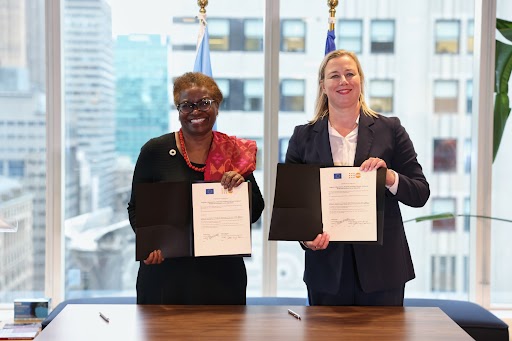Updates
The European Union and UNFPA join forces to strengthen women's health in Afghanistan
24 Sep 2024
Updates
24 Sep 2024
New York, UNITED NATIONS – The European Union and UNFPA, the United Nations sexual and reproductive health agency, have signed a new agreement to safeguard women’s and girls’ health in Afghanistan over the next three years.
This new €15 million (US$17 million) contribution to UNFPA’s work will focus on protecting the health and well-being of midwives, women and young people across eight provinces in Afghanistan to avert preventable maternal deaths and ensure access to healthcare for the most vulnerable amid the country’s ongoing humanitarian crisis.

The signing took place at the European Union Delegation in New York on the margins of the UN General Assembly between European Commissioner for International Partnerships Jutta Urpilainen and UNFPA Executive Director Dr. Natalia Kanem.
Since 2021, Afghanistan’s humanitarian crisis has worsened dramatically, particularly for women and girls. Over 23.7 million people – more than half the country’s population – are now in urgent need of protection and survival assistance.
Restrictions imposed on women’s rights have reversed years of progress, making it even harder for women to access essential health services. This has exacerbated an already dire maternal health crisis: Even before 2021, one Afghan woman died every hour from pregnancy-related complications.
Each month, an estimated 20,000 women give birth in hard-to-reach areas of the country. They face particular challenges reaching hospitals or health facilities.
The EU-UNFPA partnership seeks to address these challenges by focusing on protecting the health and well-being of midwives to exercise their work, strengthening the capacity of health facilities, and improving access to maternal and reproductive health services.
Over the next three years, the new funding will facilitate improved access to critical resources such as psychosocial support services, and reproductive, maternal and child health information.
The project, entitled “Support to Reproductive, Maternal, Neonatal, Child and Adolescent Health and Nutrition and Psychosocial Support Services in Afghanistan” will support 20 new Family Health Houses and 39 existing ones, alongside two midwifery-led maternity care centres. In these facilities, women will have access to life-saving maternal and newborn care.
UNFPA has long been a key partner to Afghanistan’s health sector, setting up 477 Family Health Houses in some of the country’s most remote areas. The community-led clinics, staffed by midwives like Mariza Ahmadi, provide crucial maternal care and have helped more than 5 million people access services since 2021.
“I stayed because people needed my support and I had to serve them in such crucial situations,” Ms. Ahmadi told UNFPA.
Without sustained and immediate international support, the impact on maternal health in Afghanistan in 2024 could be devastating: An estimated 383,000 unintended pregnancies and nearly 6,000 preventable maternal deaths are expected if reproductive health services are not expanded.
“Investing in women’s health and well-being in Afghanistan is not just a humanitarian priority – it is essential for the long-term stability of communities,” said UNFPA Executive Director Dr. Natalia Kanem. “This new partnership with the EU will allow us to scale up our response and reach even more women and girls who need urgent support.”
European Commissioner Jutta Urpilainen highlighted the EU's commitment to advancing gender equality, stating, “Afghanistan is one of the most difficult contexts in the world for women and girls. The EU’s basic needs assistance to them is delivered with the help of trusted partners like UNFPA following the principled “for women, by women” approach. This partnership aims at preventing unnecessary deaths and suffering and safeguarding the health and well-being of our Afghan sisters.”
The European Union has partnered with UNFPA for over 20 years to advance sexual and reproductive health and rights around the globe. The EU also plays a pivotal role in supporting the UNFPA Supplies Partnership, which provides life-saving contraceptives and maternal health supplies to women and girls worldwide, among many other EU-supported initiatives. In Afghanistan, the EU has provided more than €5.7 million in humanitarian funding for UNFPA’s support to women and girls across the country since 2021.